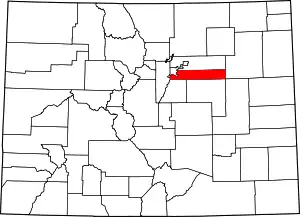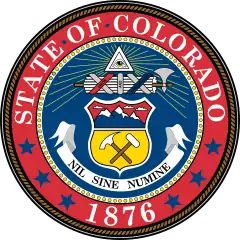Englewood, Colorado
The City of Englewood is a Home Rule Municipality located in Arapahoe County, Colorado, United States. Englewood is located immediately south of Denver and is a part of the Denver–Aurora–Lakewood, CO Metropolitan Statistical Area. As of 2010, its population was 30,255. Englewood is part of the Denver metropolitan area. Englewood is located in the South Platte River Valley east of the Front Range. Downtown Englewood is located directly east of the confluence of Little Dry Creek and the South Platte River, between Santa Fe Drive and Broadway.
Englewood, Colorado | |
|---|---|
Home Rule Municipality[1] | |
| City of Englewood[1] | |
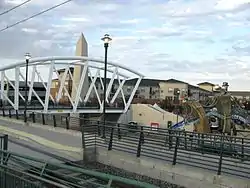 CityCenter Englewood. | |
 Seal | |
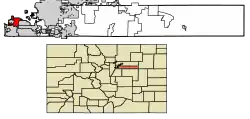 Location of the City of Englewood in Arapahoe County, Colorado. | |
 Englewood Location of the City of Englewood in the United States. | |
| Coordinates: 39°38′47″N 104°59′38″W[2] | |
| Country | |
| State | |
| County | Arapahoe County[3] |
| City | Englewood[1] |
| Founded | 1860, as Orchard Place |
| Incorporated | May 9, 1903[4] |
| Government | |
| • Type | Home Rule Municipality[1] |
| • Mayor | Linda Olson [5] |
| Area | |
| • Total | 6.65 sq mi (17.21 km2) |
| • Land | 6.56 sq mi (16.98 km2) |
| • Water | 0.09 sq mi (0.23 km2) |
| Elevation | 5,371 ft (1,637 m) |
| Population (2010) | |
| • Total | 30,255 |
| • Estimate (2019)[8] | 34,917 |
| • Density | 5,325.15/sq mi (2,056.05/km2) |
| Time zone | UTC−7 (MST) |
| • Summer (DST) | UTC−6 (MDT) |
| ZIP codes[9] | 80110 & 80113, PO Boxes 80150 & 80151 & 80155 |
| Area code(s) | Both 303 and 720 |
| FIPS code | 08-24785 |
| GNIS feature ID | 0204715 |
| Website | City of Englewood |
Englewood is the fourth most populous city in Arapahoe County and, in 2010, was the 23rd-most populous city in Colorado.
History
The recorded history of Englewood began in 1858, when gold was discovered on what came to be called Little Dry Creek by William Green Russell, an early settler of the High Plains. Two years later, Thomas Skerritt, considered to be the founder of the city, established a home in the area, which was called Orchard Place.[10] Four years later, the first road connecting Denver and Orchard Place was created by Skerritt himself, using his own plough. In 1879, the first telephone arrived in the area.
In 1883, the Cherrelyn horsecar path was laid. The Cherrelyn trolley was and is an important city icon, being carried up Broadway by horse and down by gravity. The city was ncorporated in 1903, but Skerritt was edged out by J.C. Jones as the first city mayor. Jones was a prominent landowner, having originally owned almost all of what is now north Englewood. The next two years brought the establishment of the first newspaper in the city, soon to be named the Herald. In 1905, Swedish National Sanitorium was founded, soon to become the massive present-day Swedish Medical Center. The first pavement and street lights were installed in 1906, and a year later, the police and fire departments were established. In 1908, the Cherrelyn horse trolley stopped running.

A great period of change for the city occurred in 1948; 2,500 acres (1,000 ha) on the Platte Canyon were purchased, and soon McLellan Reservoir was created. This ensured water independence from the powerful Denver Water, and in fact, Englewood provides water to most of the south metro area now due to its vast, early established water rights. Soon after, the city embarked on a huge building boom; most of the city was in fact built up by 1960.
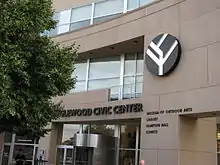
In 1965, City Park was sold to make way for Cinderella City, the largest mall west of the Mississippi River and one of the largest in the world when it opened in 1968. The developer provided the funds to create a vast city park network to replace the single City Park on which the mall was built. About 30 years later, the city demolished the defunct mall to make way for a new, transit-oriented development that would also contain a new Civic Center, library, and the relocated city hall. The RTD completed its southwest light-rail corridor in 2000, and established passenger rail transit in Englewood.
In 2004, Englewood opened the Pirates Cove water park as part of a multimillion-dollar improvement package for the city parks system. In addition to Pirates Cove, many improvements were made to the South Platte River trail system and the Englewood Recreation Center, originally constructed in 1975.
Englewood is a full-service city with its own, independent park, library, and public works systems. It provides snowplow service to neighboring municipalities and water to a large portion of the metro area.
Geography
Englewood is located at 39°38′49″N 104°59′31″W (39.646837, -104.991986).[11] The city is 5,371 feet (1,637 m) above sea level, higher than Denver.
According to the United States Census Bureau, the city has a total area of 6.6 square miles (17 km2), of which, 6.6 square miles (17 km2) are land and 0.1 square miles (0.26 km2) (0.76%) is covered by water.
Climate
Englewood features a climate very similar to that of Denver, but is slightly milder and more stable due to the city's location in a very low part of the South Platte River valley. Winds are very sparse throughout the city. The Köppen climate classification labels Englewood as having a cold, semiarid climate, BSk on climate maps.[12]
| Climate data for Englewood, Colorado | |||||||||||||
|---|---|---|---|---|---|---|---|---|---|---|---|---|---|
| Month | Jan | Feb | Mar | Apr | May | Jun | Jul | Aug | Sep | Oct | Nov | Dec | Year |
| Record high °F (°C) | 72 (22) |
75 (24) |
87 (31) |
89 (32) |
94 (34) |
105 (41) |
108 (42) |
104 (40) |
100 (38) |
96 (36) |
81 (27) |
76 (24) |
108 (42) |
| Average high °F (°C) | 43 (6) |
46 (8) |
53 (12) |
61 (16) |
70 (21) |
81 (27) |
87 (31) |
84 (29) |
76 (24) |
64 (18) |
51 (11) |
43 (6) |
63 (17) |
| Average low °F (°C) | 19 (−7) |
22 (−6) |
28 (−2) |
36 (2) |
45 (7) |
53 (12) |
59 (15) |
57 (14) |
48 (9) |
37 (3) |
26 (−3) |
19 (−7) |
37 (3) |
| Record low °F (°C) | −32 (−36) |
−33 (−36) |
−25 (−32) |
−7 (−22) |
13 (−11) |
27 (−3) |
36 (2) |
32 (0) |
15 (−9) |
−8 (−22) |
−21 (−29) |
−32 (−36) |
−33 (−36) |
| Average precipitation inches (mm) | 0.39 (9.9) |
0.40 (10) |
0.94 (24) |
1.24 (31) |
1.17 (30) |
1.13 (29) |
1.52 (39) |
1.35 (34) |
0.72 (18) |
0.59 (15) |
0.54 (14) |
0.42 (11) |
10.42 (265) |
| Source: MSN Weather[13] | |||||||||||||
Neighborhoods
Central Englewood can be roughly divided into quadrants, divided by Hampden Avenue and Broadway. The northwest is the oldest section of the city, containing the new City Center, downtown, and housing stock dating to the 1910s. This is also where the massive General Iron metal fabrication plant was located, which closed in the 1990s and has now been demolished, awaiting redevelopment and a new proposed light-rail station at Bates Avenue. The southwest section is home to a newer housing stock, as well as a significant percentage of Englewood's industrial and production facilities.
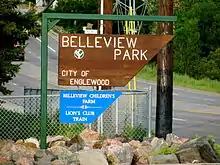
The southwest side also features Belleview Park, its largest park, and a small reservoir. The southeast section is almost purely residential, and is newer than the north and southwest sides. Finally, northeast Englewood is home to one of the largest hospital complexes in the metro area. Swedish Medical Center and Craig Hospital, a top-10, nationally ranked[14] rehabilitation hospital for spinal cord and traumatic brain injury rehabilitation, comprise the hospital district, the backbone of the city economy. The Hampden Hills neighborhood hosts one of the largest conglomeration of apartment complexes in the metro area, and is also the newest developed part of the city, as well as the wealthiest.
Englewood also features some large annexed areas, such as the northwest annex that extends to Evans Avenue in Denver, which is chiefly manufacturing and industry. Finally, Englewood extends southeast to the Highline Canal, and southwest past Federal Blvd. approaching the town of Bow Mar.
Demographics
| Historical population | |||
|---|---|---|---|
| Census | Pop. | %± | |
| 1910 | 2,983 | — | |
| 1920 | 4,356 | 46.0% | |
| 1930 | 7,980 | 83.2% | |
| 1940 | 9,680 | 21.3% | |
| 1950 | 16,869 | 74.3% | |
| 1960 | 33,398 | 98.0% | |
| 1970 | 33,695 | 0.9% | |
| 1980 | 30,021 | −10.9% | |
| 1990 | 29,387 | −2.1% | |
| 2000 | 31,727 | 8.0% | |
| 2010 | 30,255 | −4.6% | |
| 2019 (est.) | 34,917 | [8] | 15.4% |
| U.S. Decennial Census[15] | |||
As of the census[16] of 2000, 31,727 people, 14,392 households, and 7,469 families were residing in the city. The population density was 4,843.8 people/sq mi (1,870.2/km2). The 14,916 housing units averagedf 2,276.4/sq mi (879.3/km2). The racial makeup of the city was 87.8% White, 1.5% African American, 1.3% Native American, 1.9% Asian, and 2.6% from two or more races.[17] Hispanics or Latinos of any race were 13% of the population.[18]
Of the14,392 households, 23.6% had children under the age of 18 living with them, 36.7% were married couples living together, 10.8% had a female householder with no husband present, and 48.1% were not families. About 37.9% of all households were made up of individuals, and 9.5% had someone living alone who was 65 years of age or older. The average household size was 2.15, and the average family size was 2.88.
In the city, the age distribution was 20.3% under 18, 9.6% from 18 to 24, 35.9% from 25 to 44, 20.0% from 45 to 64, and 14.2% who were 65 or older. The median age was 36 years. For every 100 females, there were 98.1 males. For every 100 females age 18 and over, there were 96.4 males.
The median income for a household in the city was $38,943, and tfor a family was $47,290. Males had a median income of $32,636 versus $28,480 for females. The per capita income for the city was $20,904. About 4.9% of families and 8.2% of the population were below the poverty line, including 9.0% of those under age 18 and 7.5% of those age 65 or over.
Government and infrastructure
The Federal Correctional Institution, Englewood, is named after Englewood, but is not near Englewood.[19] It is in unincorporated Jefferson County.[20]
Education
The City of Englewood is served by the Englewood Public Schools, a district with two high schools, Englewood High and Colorado's Finest High School Of Choice. Small parts of the city are served by the Littleton Public Schools and the Sheridan Public Schools. The two middle schools are Englewood Middle School and Englewood Leadership Academy. The four elementary schools are Bishop, Clayton, Charles Hay, and Cherrelyn. Some of neighboring Cherry Hills Village is within the Englewood school district.
The city is also home to a number of private schools, including the Saint Louis School, a large Catholic K-12 institution and All Souls School serving grades K-8. Also, the city used to host the Denver Seminary, an evangelical graduate-level religious school that has since relocated to Littleton. The former seminary site has been redeveloped into residential apartments and retail. Englewood is also the location of Humanex Academy, a private, alternative middle and high school for students who have learning disabilities and emotional and behavior disorders.
Economy
Business process outsourcing company TTEC is based in Englewood.
Top employers
According to the city's 2017 Comprehensive Annual Financial Report,[21] the top employers in the city are:
| # | Employer | # of Employees | % of City Employed |
|---|---|---|---|
| 1 | Columbia Swedish Medical Center | 2,041 | 7.50% |
| 2 | Craig Hospital | 815 | 3.00% |
| 3 | Encore Electric | 560 | 2.06% |
| 4 | Englewood School District | 491 | 1.80% |
| 5 | City of Englewood | 425 | 1.56% |
| 6 | Groove Toyota Dealership | 420 | 1.54% |
| 7 | Kärcher North America | 367 | 1.35% |
| 8 | Metro Community Provider Network | 331 | 1.22% |
| 9 | Transdev North America | 295 | 1.08% |
| 10 | Regional Transportation District (RTD) | 251 | 0.92% |
Points of interest
Adjacent municipalities and unincorporated areas
The place name "Englewood" is assigned to four ZIP codes (80110, 80111, 80112, 80113)[22] which cover areas adjacent to the city on the west and east, and an area southeast of the city that is much larger than the city itself. Thus, many addresses written as "Englewood, Colorado" are actually in the Arapahoe County cities of Sheridan, Cherry Hills Village, Greenwood Village, or Centennial; or in Meridian in unincorporated Douglas County. This area includes part of the Denver Tech Center and the surrounding commercial development along the I-25 corridor, which is often erroneously attributed to Englewood; the city actually lies several miles west.
| North: Denver | ||
| West: Sheridan, Bow Mar, Denver, Littleton | East: Denver, Cherry Hills Village, Greenwood Village | |
| South: Littleton, Greenwood Village |
Notable people
Notable individuals who were born in or have lived in Englewood include missionary and archaeologist David Crockett Graham,[23] civil rights activist Carlotta Walls LaNier,[24] and railroad executive Louis W. Menk.[25] |United States|Colorado}}
References
- "Active Colorado Municipalities". State of Colorado, Colorado Department of Local Affairs, Division of Local Government. Retrieved January 26, 2021.
- "2014 U.S. Gazetteer Files: Places". United States Census Bureau. July 1, 2014. Retrieved January 6, 2015.
- "Colorado Counties". State of Colorado, Colorado Department of Local Affairs, Division of Local Government. Retrieved January 26, 2021.
- "Colorado Municipal Incorporations". State of Colorado, Department of Personnel & Administration, Colorado State Archives. 2004-12-01. Retrieved 2007-09-02.
- https://www.englewoodco.gov/inside-city-hall/city-council/linda-olson-district-2
- "2019 U.S. Gazetteer Files". United States Census Bureau. Retrieved July 1, 2020.
- "US Board on Geographic Names". United States Geological Survey. 2007-10-25. Retrieved 2008-01-31.
- "Population and Housing Unit Estimates". United States Census Bureau. May 24, 2020. Retrieved May 27, 2020.
- "ZIP Code Lookup". United States Postal Service. Archived from the original (JavaScript/HTML) on September 3, 2007. Retrieved September 12, 2007.
- "Chronology of Englewood's History". 2005. Archived from the original on 2006-09-25. Retrieved 2009-06-16.
- "US Gazetteer files: 2010, 2000, and 1990". United States Census Bureau. 2011-02-12. Retrieved 2011-04-23.
- "Englewood, Colorado Köppen Climate Classification (Weatherbase)". Weatherbase. Retrieved 14 March 2018.
- "Annual Weather Averages for Englewood, CO". 2009. Archived from the original on 2010-08-25. Retrieved 2009-06-18.
- "Best Hospitals - US News and World Report". 2009. Retrieved 2009-06-16.
- "Census of Population and Housing". Census.gov. Retrieved June 4, 2015.
- "U.S. Census website". United States Census Bureau. Retrieved 2008-01-31.
- "Profile of General Demographic Characteristics: 2000 more information Census 2000 Summary File". United States Census Bureau. Retrieved 20 February 2019.
- "Englewood (city), Colorado Quick Facts from the US Census Bureau". 2009. Archived from the original on 2012-06-18. Retrieved 2009-10-18.
- Jones, Rebecca. "Article: Prison Has a Field of Vision." Rocky Mountain News. May 2, 1999. Retrieved on July 28, 2010. "You're talking about the Englewood Federal Correctional Institution - which, interestingly, is nowhere near Englewood, but that's the federal government for you. (It has a Littleton mailing address, as does most of south Jefferson County, though it's nowhere near Littleton, either, but that's a wacky question for another day.)"
- "FCI Englewood Contact Information." Federal Bureau of Prisons. Retrieved on July 28, 2010.
- City of Englewood CAFR
- "Englewood Zip Code clarification - City of Englewood, Colorado". www.englewoodgov.org. Retrieved 14 March 2018.
- Brown, Jean Graham (1993). "Graham, David Crockett and Alicia May (Morey)". In Altenbach, Roy and Ethel, and The Englewood Historical Society (ed.). A History of Englewood, Colorado. Dallas: Curtis Media Corporation. pp. 325–326. ISBN 0-88107-228-1.
- "Carlotta Walls LaNier (1942- )". The Encyclopedia of Arkansas History & Culture. Central Arkansas Library System. Retrieved 2016-04-18.
- "Louis W. Menk". National Railroad Hall of Fame. Retrieved 2016-04-18.
